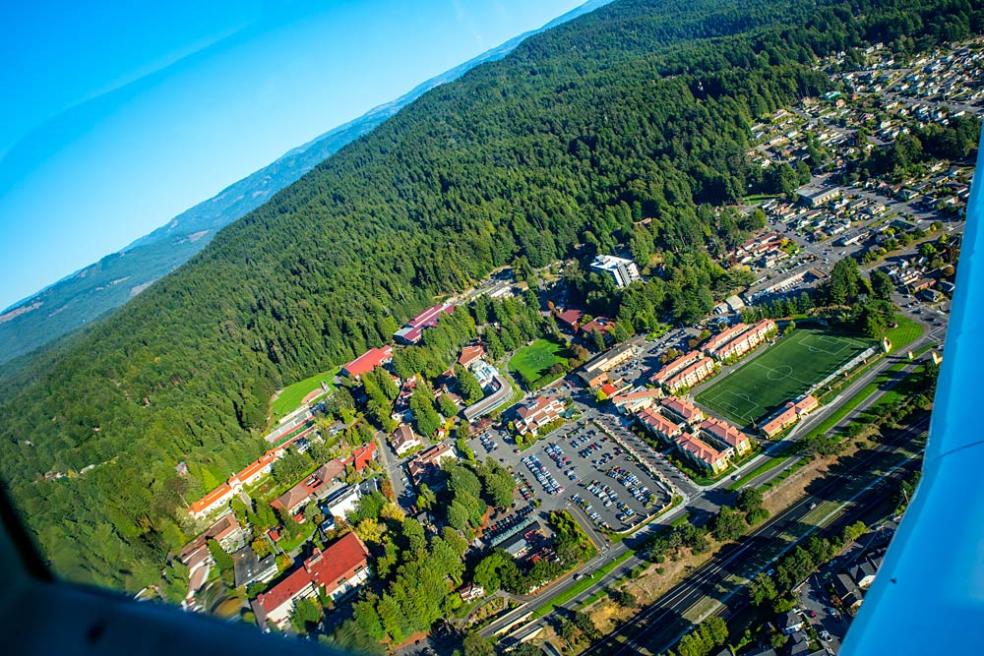Travel
Neutralizing Carbon Footprint Through Business Travel Carbon Offset

“We don’t want to restrict air travel; we value the collaboration, communications, experiences, and relationship building that air travel affords to our campus community. But we also need to lower our emissions, so purchasing carbon offsets is a great way to neutralize the University’s air travel emissions,” says Morgan King, Cal Poly Humboldt’s climate action analyst.
Carbon offsets are certificates representing the removal of one metric ton of carbon dioxide emission (CO2e). Carbon offsets on the voluntary market are available for purchase by individuals, institutions, and businesses to offset carbon emissions from travel and daily activities. Essentially, carbon offsets fund projects that reduce greenhouse gas emissions, like forest conservation projects or improved forest management.
The University will partner with the city of Arcata to purchase verified carbon offsets from the Arcata Community Forest using rebate funding.
“The city of Arcata is pleased to continue our partnership with Cal Poly Humboldt on local sustainability programs. The purchase of carbon offset credits through the City’s verified forest carbon program will help compensate for greenhouse gas emissions resulting from travel for university business. The purchase of carbon offsets supports the Arcata Community Forest to continue growing large, old trees and sequestering carbon for the next 100 years,” says Arcata’s Environmental Services Director Emily Sinkhorn.
The city of Arcata oversees multiple programs and projects that actively sequester carbon including:
The Arcata Community Forest emphasizes carbon sequestration by growing trees on extended rotations, designating reserves, and adding forest acres that could otherwise be developed
The Riparian Forest Establishment, which established more than 100 acres of new riparian forest along creeks and bottomlands
The Salt Marsh Project at McDaniel Slough Marsh Restoration Project, which sequesters additional carbon on its 240-acre site, creating a case study that will be used to help develop sequestration protocols for salt marsh restoration activities
The Urban Forestry Project is an active program to expand the planting of trees in the urban landscape including parks, roadside greenways, and the downtown area.
As an example, in 2023-24, the University’s air travel contributed to about 2.5% of the campus’s carbon footprint or 316.45 metric tons of carbon dioxide equivalent. To help offset this impact, the University could have purchased carbon offsets from the city of Arcata. Each carbon offset from the Arcata Community Forest represents removing one metric ton of CO2e and may cost $30, although the cost may fluctuate depending on the market and other factors, so it would have cost the University, $9,494 to neutralize last year’s air travel. This offset equaled 316.45 metric tons of CO2e, the equivalent of 809,342 miles driven by an average gasoline-powered passenger car.
The University will make its first purchase of carbon offsets from the city of Arcata next July, neutralizing its air-travel carbon footprint for the 2024-25 fiscal year.
In 2023, Cal Poly Humboldt introduced its Climate Action Plan 2.0, a roadmap to achieve carbon neutrality by 2045, featuring 35 strategies to reduce fossil fuel consumption and enhance climate resilience, including the purchase of offsets. The carbon offset not only aids in reducing the University’s carbon footprint but also brings benefits to a local partner and the campus community. The Arcata Community Forest, which spans 2,350 acres and borders the Cal Poly Humboldt campus, plays a vital role in providing education, research, and recreational opportunities to the campus community.
This sustainably managed redwood forest sequesters carbon, provides various ecosystem services that enhance the climate resilience of the campus and community and has undergone third-party verification to be included in the Climate Action Reserve carbon credit registry.
“Buying carbon offsets from the city of Arcata presents an incredible opportunity for the University to slash carbon emissions while also backing a valuable local resource,” King says.








.jpg)
